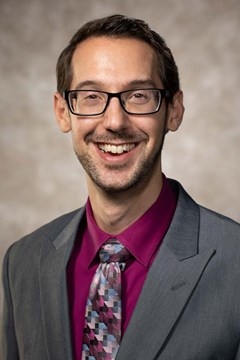
A new U of A faculty member launched a long-term, nationwide study last week exploring how students with autism define success in college and what helps them thrive while attending.
Brett Ranon Nachman, an assistant professor of adult and lifelong learning in the College of Education and Health Professions, is the co-principal investigator on the new, longitudinal project funded by a $90,000 grant from The FAR Fund and a $27,500 grant from the Frist Center for Autism and Innovation at Vanderbilt University.
Nachman's research focuses on how college students with autism navigate higher education and examines how college campuses can be more accepting of those students. The new study invites autistic undergraduate students in the United States to share factors that are important to their success, however they define it, including experiences related to their health, academics and employment.
The study was developed by a multidisciplinary team of researchers, practitioners and self-advocates, which is unique. It also seeks a nuanced, comprehensive picture of autistic students' experiences. These insights have the potential to significantly improve the lives of autistic college students, help higher education institutions better support them and set the stage for developing an extensive database for scholarly research, Nachman said.
"Autistic students' stories are not always illuminated, by virtue of lack of diagnosis or disclosure for many, as well as inattention to this community in some spaces," he said. "Yet they are increasingly enrolled on our college campuses and can make significant contributions to our communities when they feel they are heard, supported and valued."
Nachman understands this better than most. "As someone who navigated postsecondary education as an autistic individual, I believed that the distinct challenges that I faced were rather unique, as I rarely encountered individuals who I knew could relate to my challenges," he said.
Those challenges included difficulty interpreting nonverbal communication and needing to mitigate transitions to reduce stress. There were also his strengths to consider, such as being detail-oriented and having a keen memory for certain facts. "Not until I started to explore nascent research on autism/higher education when I started my graduate school experience in 2015, did I realize the prevalence of colleges and universities not attending to autistic college students' strengths, needs, differences and opportunities," he said.
Instead, most literature painted a limited and deficit-based picture of autistic students, Nachman noted.
"However, I quickly connected with researchers who were changing the paradigm with their intentionality in producing thoughtful, well-rounded research on the autism experience in higher education, and soon I began to contribute to this space, too," he said.
Over the past three years, Nachman has published eight peer-reviewed journal articles on different aspects of autism in higher education, including a case study designed to inform institutional leaders on making their campuses more accepting. Another study analyzed autistic LGBTQ+ college students' experiences.
"What motivates my research is a personal and professional mission to ensure that autistic college students' experiences are better understood and appreciated to create positive change," he said.
Before joining the U of A this fall, Nachman was a postdoctoral research scholar at North Carolina State University's Belk Center for Community College Leadership and Research. He earned a doctorate from the University of Wisconsin-Madison's Educational Leadership and Policy Analysis Program. Nachman is the research director for the College Autism Network, a non-profit organization centered on serving autistic college students via advocacy, research and training efforts.
Topics
Contacts
Shannon G. Magsam, director of communications
College of Education and Health Professions
479-575-3138, magsam@uark.edu